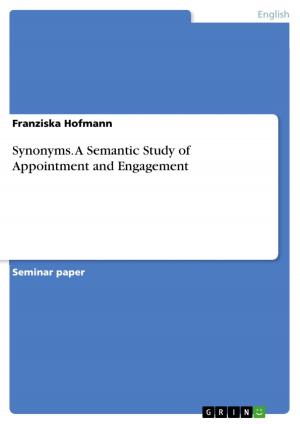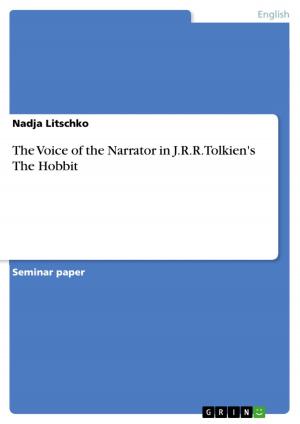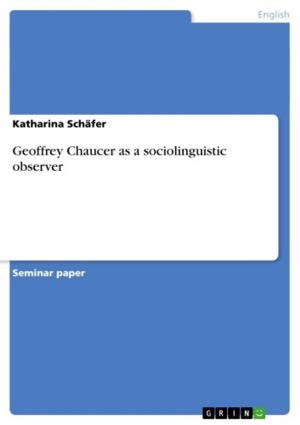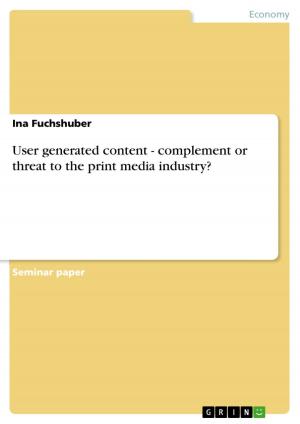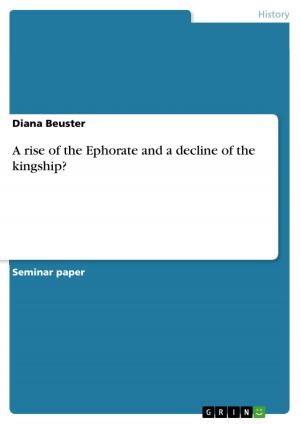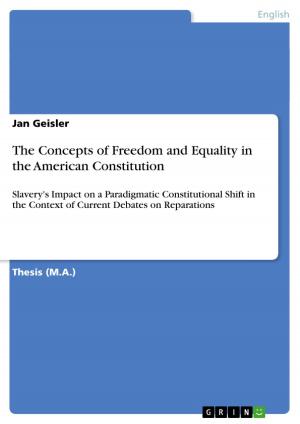Beyond Archangel - The Archangel Theme in Mary Shelley's Frankenstein
The Archangel Theme in Mary Shelley's Frankenstein
Fiction & Literature, Literary Theory & Criticism, British| Author: | Melanie Kirkham | ISBN: | 9783638828215 |
| Publisher: | GRIN Publishing | Publication: | July 23, 2007 |
| Imprint: | GRIN Publishing | Language: | English |
| Author: | Melanie Kirkham |
| ISBN: | 9783638828215 |
| Publisher: | GRIN Publishing |
| Publication: | July 23, 2007 |
| Imprint: | GRIN Publishing |
| Language: | English |
Seminar paper from the year 2005 in the subject English Language and Literature Studies - Literature, grade: A, The University of Utah (-), course: Research and Bibliography, 15 entries in the bibliography, language: English, abstract: In my paper 'Beyond Archangel' I take a semiotic and thematic approach to the theme of Archangel in the novel. In the novel the term 'Archangel' shows up over and over again and many references are made to other themes relating to heaven and hell, such as Dante's Inferno. Geographically, the novel begins in a place beyond the city Archangel. It is an actual city in the Artic named after the archangel Michael. It is the Christian archangel Michael, but a whole tradition; Judaic, Greek... surrounds him. Therefore, in the text the word Archangel takes on multiple meanings as it refers to the physical place but also the spiritual place the three main characters are in. Victor, Walton and the Creature, all three of them are beyond Archangel, that means beyond the state of being in God's grace. They are closer to hell than to heaven. Victor, one of the characters has already fallen and there is no help for him. The Creature and Walton seem to be beyond all hope for salvation as well, but one of them will ultimately be saved. It is the Creature who takes on another archangel persona and through this selfless act manages to save Walton from his fast track to damnation. Through the Creature Walton manages to shake off Victor's spell over him, and return to the save haven of Archangel. Here again, the city takes on a meaning of being a place of God. The Creature never physically returns to Archangel, but he is redeemed through his actions. The three main characters therefore represent the three different spiritual states: Fallen, redeemed and saved by grace. I will look at religion and what the meaning of an archangel is. Mary Shelley herself was acquainted with different religions and her knowledge influenced her novel, of course. I want to be present the different religious traditions that are found in the text and explore what it means for Frankenstein.
Seminar paper from the year 2005 in the subject English Language and Literature Studies - Literature, grade: A, The University of Utah (-), course: Research and Bibliography, 15 entries in the bibliography, language: English, abstract: In my paper 'Beyond Archangel' I take a semiotic and thematic approach to the theme of Archangel in the novel. In the novel the term 'Archangel' shows up over and over again and many references are made to other themes relating to heaven and hell, such as Dante's Inferno. Geographically, the novel begins in a place beyond the city Archangel. It is an actual city in the Artic named after the archangel Michael. It is the Christian archangel Michael, but a whole tradition; Judaic, Greek... surrounds him. Therefore, in the text the word Archangel takes on multiple meanings as it refers to the physical place but also the spiritual place the three main characters are in. Victor, Walton and the Creature, all three of them are beyond Archangel, that means beyond the state of being in God's grace. They are closer to hell than to heaven. Victor, one of the characters has already fallen and there is no help for him. The Creature and Walton seem to be beyond all hope for salvation as well, but one of them will ultimately be saved. It is the Creature who takes on another archangel persona and through this selfless act manages to save Walton from his fast track to damnation. Through the Creature Walton manages to shake off Victor's spell over him, and return to the save haven of Archangel. Here again, the city takes on a meaning of being a place of God. The Creature never physically returns to Archangel, but he is redeemed through his actions. The three main characters therefore represent the three different spiritual states: Fallen, redeemed and saved by grace. I will look at religion and what the meaning of an archangel is. Mary Shelley herself was acquainted with different religions and her knowledge influenced her novel, of course. I want to be present the different religious traditions that are found in the text and explore what it means for Frankenstein.

